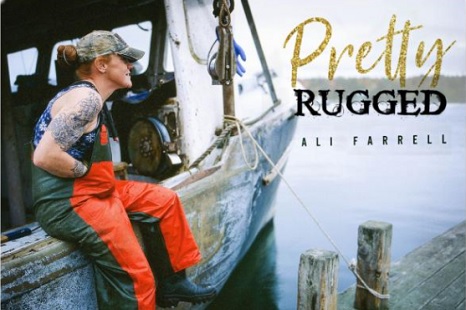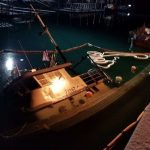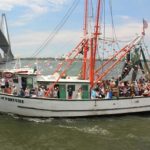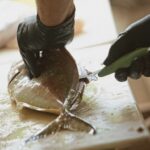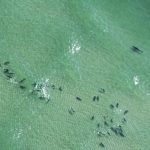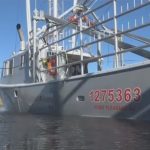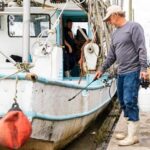Tag Archives: Maine fishermen

Donald Trump Pledges to Halt Big Wind Subsidies
Donald Trump’s election victory is quickly taking the wind out of the Biden administration’s ambitious renewables initiatives. President-elect Trump promised to end federal subsidies for offshore wind projects on his first day in office. As with many of his campaign pledges, Americans wait to see whether he will deliver. However, the market did not wait to see. Stock prices of offshore wind developers and turbine makers moved sharply downward following election day as investors query whether windmill projects are economically viable without the hefty federal subsidies Trump has promised to terminate. Environmental groups and fishermen have also raised concerns about the potential ecological trade-offs of this plastic-based technology and worries about ecotoxins created in the manufacturing of solar panels and EVs have caused consumers to pause. more, >>CLICK TO READ<< 10:22
Maine Fishermen Caught More Fish in 2023, Thanks to a Hunger Relief Program and COVID Funds
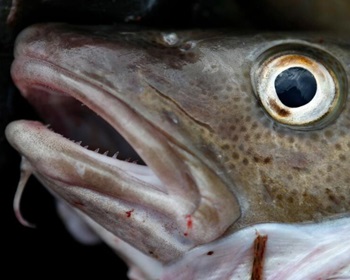 Maine fishermen bucked yearslong, industrywide trends last year and caught more fish, a development regulators and industry members said shows the impact of COVID-19 relief funds. The catch of haddock more than doubled to more than 500,000 pounds (226,796 kilograms), and the catches of Atlantic cod, witch flounder and Atlantic halibut were all up significantly. Federal money also supported the Fishermen Feeding Mainers program, which buys fish to support food banks and schools. Maine Coast Fishermen’s Association, an industry nonprofit group, launched the Fishermen Feeding Mainers program in part to help the groundfish industry survive the COVID-19 pandemic. more, >>click to read<< 15:23
Maine fishermen bucked yearslong, industrywide trends last year and caught more fish, a development regulators and industry members said shows the impact of COVID-19 relief funds. The catch of haddock more than doubled to more than 500,000 pounds (226,796 kilograms), and the catches of Atlantic cod, witch flounder and Atlantic halibut were all up significantly. Federal money also supported the Fishermen Feeding Mainers program, which buys fish to support food banks and schools. Maine Coast Fishermen’s Association, an industry nonprofit group, launched the Fishermen Feeding Mainers program in part to help the groundfish industry survive the COVID-19 pandemic. more, >>click to read<< 15:23
Catch of the Night
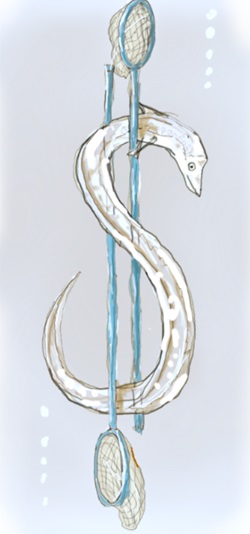 The American eel’s lifestyle is as elusive as it gets. No one has seen one mate in the Sargasso Sea, the eel’s birthplace. However, we know that after hatching, eels begin their journey to land by following the Antilles Current and Gulf Stream toward the mouths of North American rivers. Elvers (juvenile specimens also known as glass eels) then venture inland, mature, and later return to the ocean to mate, with the entire process ranging from a few months to a few years in duration. The unfortunate truth is that eel populations worldwide are rapidly declining. They have faced overfishing since the 1970s, resulting in poaching regulations in most of the world. Today, just two US states award eel fishing licenses: South Carolina and Maine. Because South Carolina only allows traps for fully grown eels, Maine has become the heart of the elver issue. more, >>click to read<< By Phil Avilov10:31
The American eel’s lifestyle is as elusive as it gets. No one has seen one mate in the Sargasso Sea, the eel’s birthplace. However, we know that after hatching, eels begin their journey to land by following the Antilles Current and Gulf Stream toward the mouths of North American rivers. Elvers (juvenile specimens also known as glass eels) then venture inland, mature, and later return to the ocean to mate, with the entire process ranging from a few months to a few years in duration. The unfortunate truth is that eel populations worldwide are rapidly declining. They have faced overfishing since the 1970s, resulting in poaching regulations in most of the world. Today, just two US states award eel fishing licenses: South Carolina and Maine. Because South Carolina only allows traps for fully grown eels, Maine has become the heart of the elver issue. more, >>click to read<< By Phil Avilov10:31

Maine Fishermen slow offshore wind farm development – Keep Fighting
Actions by Maine fishermen directly affected the process of offshore wind development in the Gulf of Maine with a bill signed into law on July 7 by Governor Janet Mills. The measure was a response to plans that surfaced last year for a 16-square-mile, 12-turbine wind farm, called a “research array,” off the southern coast of Maine. Proponents promised good jobs and cheap, green electricity. Fishermen weren’t so sure. They envisioned wind farms springing up throughout the Gulf of Maine, harming marine life and damaging coastal communities. “We as fishermen work and take care of the water,” said Virginia Olsen, a Maine Lobstering Union director who lives in Stonington. “We feel these things will get dumped on the water and then someone will say, ‘Just leave them there, it’ll be a coral reef.’ But it will just be trash left for us.” >click to read< 16:55

Opposing Ocean Industrialization, Maine fishermen, families protest offshore windmills
Hundreds of Maine fishermen and their families protested offshore windmills in Augusta Wednesday. Local fishermen say they’re under attack, and that offshore windmills could ruin their industry and put them out of work. “Today’s really our opportunity to plead for public support,” Maine commercial fisherman Christopher McIntire said. “We need the support of the state of Maine in order to save our historical fishing grounds from being bought up by oversea companies.” Maine fishermen are fighting against a proposed offshore wind farm. Video, photos, >click to read< 21:23
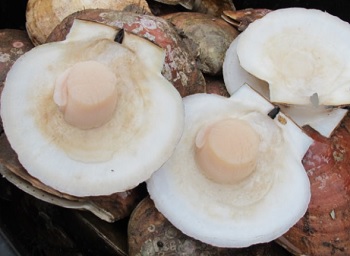
Despite unprecedented 2020 market losses, Maine fishermen brought in history’s 9th most valuable catch
Valued at $516.8 million, the ex-vessel value, or price paid at the dock, of Maine’s commercially harvested marine species was the ninth-highest on record. Maine’s lobster fishery once again accounted for most of the state’s overall landed value, with the lobster catch totaling $405.98 million. While the landed value was down from $491.2 million in 2019 and the 2016 peak of $540.7 million, it was the seventh straight year that the lobster fishery exceeded $400 million. Maine scallop fishermen brought ashore an additional 224,874 pounds compared to 2019, ranking the fishery as the third-most valuable, despite a 19-cent per pound decrease in value. >click to read< 09:12
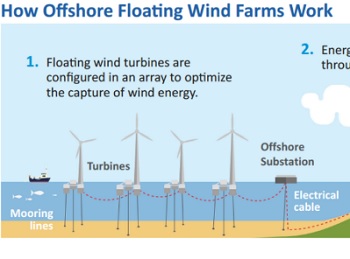
Maine Fishermen oppose offshore wind as alternative energy option – Support LD 101
“There’s so many different reasons to oppose it,” said Jack Merrill, a resident of Mount Desert and a member of the Cranberry Isles Fishermen’s Co-op,,, In an effort to meet Maine’s requirement of 80 percent of the state’s electricity from renewable sources by 2030 and the goal of 100 percent by 2050, there is a project being proposed to research offshore wind energy by installing up to 12 floating wind turbines in a 16-square-mile area, 20-40 miles off the coast. “By removing thousands of acres of bottom from fishing access, these turbines threaten the economic health of Maine’s second largest industry,,, >click to read< 13:48
Morro Bay: Fishing Industry Opposes New Floating Wind Farm Project Area – Tom Hafer, president of the 90-member Morro Bay Commercial Fishermen’s Organization, criticized the proposal, saying it amounted to a “bait and switch.” >click to read<
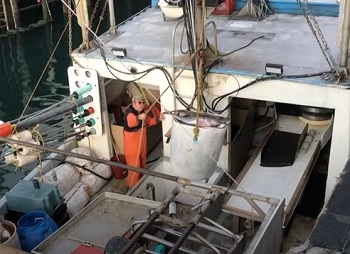
Maine fishermen donate catch to food bank, local schools
Brian Pearce of North Yarmouth usually heads out on the 45-foot Gracelyn Jane from April or May through January, fishing for monkfish or groundfish, hake, haddock, pollock, redfish, and cod. As with most everything else, though, this year was different. When Coronavirus hit, the market for local fish, primarily restaurants and exports, was among the many casualties. Pearce, along with many Maine fishermen, found it wasn’t worth the time and cost to fish, so they tied up their boats. But early Monday morning, Pearce docked at the Portland Fish Exchange and unloaded about 2,000 pounds of pollock, hake, cod, redfish, and haddock after a quick overnight trip. >video, click to read< 09:20

Coronavirus: Maine Fishermen still waiting to access pandemic relief funds
On March 27, Congress passed the Coronavirus Aid, Relief, and Economic Security (CARES) Act that, among other provisions, authorized one-time “economic impact payments” of $1,200 to adult U.S. residents with incomes of under $99,000 plus an additional payment of $500 for each child in a household. The CARES Act also established the Paycheck Protection Program to provide $349 billion in loans to businesses affected by the coronavirus shutdowns. Fishermen were eligible to apply for those loans as well as loans under the Economic Injury Disaster Loan program, but many did not realize that was the case. “Due to unclear guidance, many fishermen were initially told by their lenders they were not eligible for the Paycheck Protection Program,” lobster fisherman and state Rep. Genevieve McDonald (D-Stonington) said Monday. >click to read< 07:49
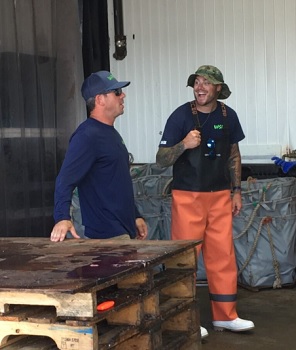
Maine Fishermen Zack Plante and Charlie Boivin, are on the new season of ‘Wicked Tuna’ along with Bob Cook of Beverly, Ma!
Zack Plante and Charlie Boivin will be featured on the ninth season of National Geographic’s reality TV show “Wicked Tuna,” beginning Sunday. They’ll be seen fishing out of their 35-foot boat, Wasabi. The point of the show is to see which crew hauls in the most bluefin tuna by season’s end, while highlighting the competitiveness and drama on the high seas along the way. Boivin and Plante are among three new crews on the show this season, competing against several other boats that have been on the show before. As the only boat from Maine, Boivin and Plante – the latter of whom a news release described as “ready to stir the pot” – went into the show with a little bit of a chip on their shoulders. >click to read< 20:10
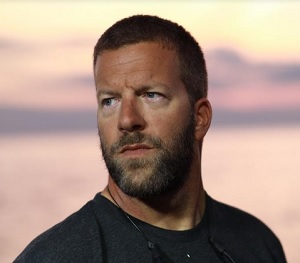 Beverly’s Bob Cook joins ‘Wicked Tuna’ – Beverly native Bob Cook has joined the cast and will make his debut aboard the Fat Tuna when the series’ ninth season gets underway this Sunday. For Cook, appearing on “Wicked Tuna” has been nearly a decade in the making. >click to read<2/28, 11:18
Beverly’s Bob Cook joins ‘Wicked Tuna’ – Beverly native Bob Cook has joined the cast and will make his debut aboard the Fat Tuna when the series’ ninth season gets underway this Sunday. For Cook, appearing on “Wicked Tuna” has been nearly a decade in the making. >click to read<2/28, 11:18
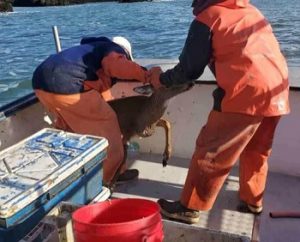
Maine fishermen snag unusual catch from the ocean
Oh dear, it’s a deer. Commercial fisherman Ren Dorr, was about 5 miles off of Harrington when he brought in an animal from the sea that was definitely not part of his normal catch. Dorr posted on his Facebook page that he and his crew found a small deer drifting further and further away from land. photo’s, >click to read< 09:04
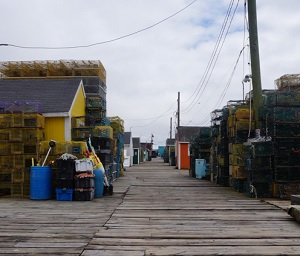
Further city waterfront restrictions won’t benefit fishermen
People who fish for a living need new berthing, enhanced branding, higher catch prices and a vibrant local economy. Having fished commercially for over 30 years, co-founded the Northwest Atlantic Marine Alliance to help fishermen and served as a board member of the Portland Fish Exchange, I constantly champion the working waterfront. So I fear the mistake Portland’s about to make, surrendering to slick videos from lawyers and lobbyists and approving damaging zoning on the waterfront. >click to read< by Craig A. Pendleton18:51
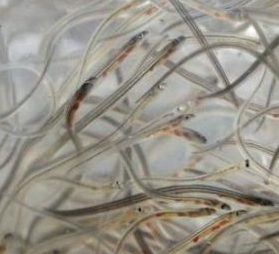
Maine Fishermen of baby eels expect high price as stocks dry up on the international market
Members of Maine’s baby-eel fishing industry are expecting high prices for the tiny fish this year because of a shortage on the international market, and sushi lovers could end up feeling the pinch. Maine is the only U.S. state with a significant fishery for baby eels, or elvers. The tiny, translucent eels are sold to Asian aquaculture companies to be raised to maturity for use as food.,,, The fishery is a source of reliable income in rural Maine. Julie Keene, an elver fishermen based in Lubec, is looking forward to a good harvest this year. >click to read<11:19
Maine Fishermen concerned about loss of disaster relief funding
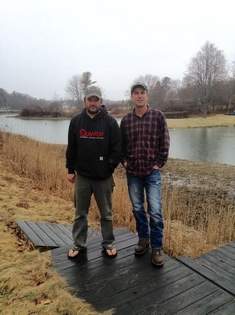 The Maine Department of Marine Resources announced on March 1 that it will soon be issuing the third and final payment to Maine-homeported commercial groundfish permit holders under federal disaster relief funding which is being issued due to changes in fishing regulations and cutbacks in the industry. This is the third and final bin of money being allotted in Maine. Other New England states have also received federal relief funding in three separate dispersions, and although it is federal money, each state has individual discretion on how to allocate use of the funds. While some other states divided the money among permit holders and their crews, Maine chose a formula based criteria for fishermen in this category to qualify for relief funds. Read the rest here 16:07
The Maine Department of Marine Resources announced on March 1 that it will soon be issuing the third and final payment to Maine-homeported commercial groundfish permit holders under federal disaster relief funding which is being issued due to changes in fishing regulations and cutbacks in the industry. This is the third and final bin of money being allotted in Maine. Other New England states have also received federal relief funding in three separate dispersions, and although it is federal money, each state has individual discretion on how to allocate use of the funds. While some other states divided the money among permit holders and their crews, Maine chose a formula based criteria for fishermen in this category to qualify for relief funds. Read the rest here 16:07
Maine House won’t overturn fines for lobsters bycaught by ground fishermen
AUGUSTA — Maine-based groundfishing boats that catch lobsters in federally regulated waters probably will continue to face the threat fines as large as $50,000, with the defeat of a bill that would have lifted the state-assessed penalties on Maine fishermen. continued @ kennebecjournal
Maine Voices: Diversity, versatility important to future health of fisheries
By PATRICK SHEPARD
In light of the recent disaster declaration for the New England groundfishery, fishermen and managers need to begin planning for the future of this important industry to ensure that affordable opportunities exist for young fishermen as groundfish stocks rebuild. Let’s fast-forward, for a moment, to when populations of cod and haddock are commercially abundant off Maine’s coast once again. What will this mean for local fishermen? The shocking, short answer is that most Maine fishermen won’t have the rights to be able to catch those fish. While there’s been a lot written about the high abundance and low price of lobsters this year, one thing that hasn’t been discussed is that most of the fishermen in this state don’t have the federal permits required to catch anything other than lobster.http://www.pressherald.com/opinion/diversity-versatility-important-to-future-health-of-fisheries_2012-10-05.html






